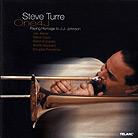October 2003
On One4J, Johnson disciples Steve Turre and good friend Robin Eubanks gathered four more of today’s top trombonists (Joe Alessi, Steve Davis, Andre Haywood and Douglas Purviance) to record an album that pays tribute to their mentor and inspiration. The track listing includes eight Johnson compositions, one Turre original, a Harold Mabern tune and a Cole Porter song. Supported by bassist Peter Washington, drummer Victor Lewis and pianist Stephen Scott, these six trombonists do more than just pay their respects. They show that the trails pioneered by Johnson are as valid today as they were when Johnson was in his prime. And in so doing they continue to demonstrate, via eight diverse voices, what a powerful and unique jazz voice the trombone remains. It’s the contrasts among the players that make this recording so exciting -- the way, for example, Turre’s lighter sound blends with Steve Davis’s more powerful tone on "What Is This Thing Called Love." The subtle sonic differences among the trombones of Davis, Haywood, Turre and Eubanks on "Wee Dot" demonstrate how distinctive four players can sound on that difficult instrument. And on three of the tunes ("Lament," "Kelo" and "El Camino Real"), the entire ensemble blends its six styles into one powerful voice to excellent effect. The sound of One4J, while good, is not up to Telarc’s usually high standards. The horns are easily identifiable -- each has the brassy, burnished slide sound that tells listeners immediately that they're hearing a trombone. Yet the power of the instrument is slightly diminished. The bass is taut, but not particularly deep. The drums have some snap and the cymbals shimmer, but not to the extent they do in Telarc’s DSD recordings. On the whole, an adequate job, one that won’t get in the way of the listener’s enjoyment of the music -- the piano, for instance gives one a sense of the hammer striking the strings. But there is little in the way of ambiance, so there is not much of a sense of the recording site. The soundstage is speaker to speaker, with decent depth to the presentation. One4J marks what one hopes will be the initial flowering of albums that pay respect to one of jazz’s top innovators -- perhaps spring has finally arrived in the post-Johnson era. It allows six of Johnson’s disciples the opportunity to demonstrate how well they’ve learned the lessons Johnson imparted. We should be thankful that Steve Turre recognized that Johnson deserved better than he’s gotten and recorded an album that both honors the memory and pushes forward the inspiration of J.J. Johnson into the future. GO BACK TO: |
 Steve Turre - One4J:
Paying Homage to J.J. Johnson
Steve Turre - One4J:
Paying Homage to J.J. Johnson Whenever we lose
one of our treasured jazz musicians, it seems that tribute albums honoring him or her pop
up like flowers in springtime. And yet when jazz trombone legend J.J. Johnson passed away
in February of 2001, it went almost unnoticed. Here was the musician who almost
single-handedly taught the world that the trombone could be a lead voice in post-swing
jazz. His surefooted, light-yet-firm, powerful and original instrumental style was the
touchstone for countless trombonists who came after him.
Whenever we lose
one of our treasured jazz musicians, it seems that tribute albums honoring him or her pop
up like flowers in springtime. And yet when jazz trombone legend J.J. Johnson passed away
in February of 2001, it went almost unnoticed. Here was the musician who almost
single-handedly taught the world that the trombone could be a lead voice in post-swing
jazz. His surefooted, light-yet-firm, powerful and original instrumental style was the
touchstone for countless trombonists who came after him.